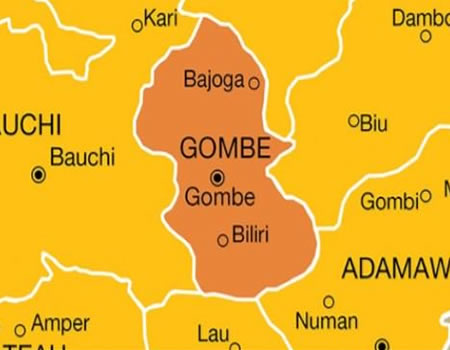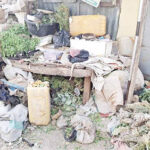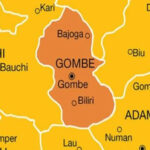The major challenge confronting Gombe State and indeed Nigeria today is insecurity. The state has undebatably exhibited a very high capacity for inter-communal, ethnic, religious and political violence in the past three decades (1988 to date). This is most important and specifically in Gombe South Senatorial District which comprises multi-tribal and religious groups with various and varied backgrounds. The main security challenge facing the state was the Boko Haram insurgency, but now it has escalated. We now have in addition, deadly inter-communal, ethnic, religious and political violence, banditry, kidnappings and ransom-taking, clashes between farmers/herders and rapes. The most notable of these was the Tula versus Awak, Dadiya Versus, Kaltungo, Tula versus Dadiya, Kaltungo versus Billiri and most recently and currently, the religious violence in Billiri over chieftaincy affairs and the Lunguda versus the Waja in Balanga Local Government Area which resulted into killings of people, burning of houses and shops, foodstuff etc. and internally displaced people in their thousands.
The most disturbing question most people may like to ask is why do the security challenges not only persist but are also escalating like wildfire for the past three decades? Why is it that the monster has come to stay and fast escalating in multi-dimensional nature that was already among the most backward in the country? Inter-communal clashes have been on a steady increase and now assumed a threatening dimension with the monumental increase in volume and ferocity of destruction of lives and properties.
- Anambra: Amidst insecurity, 38 jostle for Obiano’s seat
- Inside Kwara multi-million naira catfish business
The interest of this write up is to argue what is responsible for the old and new waves of ethnoreligious and inter-communal destructive crisis, and how should the rising trend of violence be curbed. Successive state governments from 1999 to date have recognized the existence of various forms of violent conflicts particularly inter-communal clashes in Gombe. The interest of this write up is to argue what is responsible for the old and new waves of ethnoreligious and inter-communal destructive crisis, and how the rising trend of violence should be curbed. South Senatorial District has responded in several ways. There is also the explicit recognition that Gombe State and Gombe South Senatorial District, in particular, are diverse with multiple ethnic and religious groups.
However, when violent conflicts/clashes occur, the government seem to respond to specific cases with measures to manage the situation that variously include: establishment of an inter-religious council, probe panel to investigate and advise government, humanitarian assistance to victims and increased policing of crisis areas. Very unfortunately, the destructive crises do not only persist but they escalate with greater destructions, rather than resolving them. Intensive and extensive analysis and researches revealed that the above measures usually taken by the government are elite oriented and does not address the socio-structural causes of conflicts. Rather than resolve the crisis, they only and temporarily simplify them.
Hence, the major causes and escalation of the inter-communal and religious destructive clashes are i. Lack of white paper and implementation of probe panels investigation and advise reports at all levels of government. ii. Increased policing of crisis areas are superficial and elitist. They sometimes do more harm than good by supporting one group/tribe against another, engaging in lootings, rapes, human rights violations, extra-judicial killings etc. iii. Most of the causes and escalation of the crisis are state failure. Basic needs not attended to. Thus, the state failure to improve the living standard of the people and provide security for socio-economic development. As a result, mass poverty, unemployment, destitution collapse of social services etc. The crisis has been compounded by a ravaging economic crisis and failure or lack of implementation of reform programmes, non-payment of retirees’ gratuities worth billions of naira for nearly ten years inclusive. Thus, unemployment thrives and large-scale poverty prevails.
Other causes are i. Exclusionary policies of the ruling elites that deny the people access to land for farming and very poor indigene-settlers relationship etc. ii. The politicization and manipulation of ethno-religious differences and conflicts by government and elites for their economic and political advantage have been widely accepted as one of the major causes and escalation of the crisis and general insecurity. iii. Wide-spread ignorance about religion and illiteracy amongst the people leads them to manipulation and investigations. iv. Most importantly, destructive conflicts persist and escalate because of a lack of strong, genuine, honest and sincere political will and commitment to resolve them. This is because all governments responses have been elitist, fire brigade approach, superficial and very simple and temporary.
One wonders despite the presence of police divisions, DSS, NSCDC, local government councils/peace and security committees, paramount traditional rulers etc coupled with modern means of communications, situations are allowed to degenerate to heavy destructions of lives and very valuable properties repeatedly. In this case, there is no failure of intelligence but lack of morality, value for human lives, fear of God and total negligence of the main statutory function of any government. Those who are lucky to lead others always think they are wiser. In fact, it is a tragedy. Lack of enforcement of law and order among culprits and leaders may also be responsible. According to Sagay (2014) in a situation where leaders are breaking all the rules and ethics of good governance, it is no surprise that the inclination amongst the general populace is to disrespect laws, a sense of order has also declined.
In conclusion, destructive inter-communal clashes and human security crises both old and new worries. It is undebatable that peace and security failed in the last 10 years in Gombe South Senatorial District, in addition to the persistent problems and vulnerabilities posed. The perennial communal land disputes, ethnic violence, religious and political clashes that have been on for over 30 years, should be addressed with high moral authority.
An analytical look at many of these security challenges reveal either inadequate or lack of genuine political will and commitment, action plan on community violence prevention and human security techniques; revival and strengthening of traditional relationships and values. These should be the focus on people’s survival.
The central message of this piece is to call on the government to act and it must ring out loud and clear and consume the many notoriety of few. The crisis is greatly impacting negatively on the entire communities affected and indeed Gombe State.
We humbly request the government to prevail on the situation, to develop and implement a coherent security strategy to ensure peace, stability and development. The seeming lack of high moral authority and honest political will, transparency and inclusivity are worrisome. We, therefore, call on the government to douse tension and come out with a long-term strategic initiative that will lead to a win-win solution to the problems and revive the long cordial traditional relationships and values that will sustain peace and peaceful co-existence. Unless we learn to curtail simmering problems, we run the danger of destroying ourselves.
This is certainly going to be a very bad time for most farmers and food security and the problems would be compounded if the government did not act promptly. There is no alternative to peace. Once the roots of the new crisis are not addressed through good governance and communicative peacebuilding, overcoming the challenges of inter-communal clashes will not be achieved. Investigations revealed that poor attention given to intelligence reports, lack of political will and high moral authority are causes of the re-occurrence of the crisis. Lack of early response and institutionalization of activities and integrative approach to overcome further outbreak of violent conflicts in the area have been noted. Allah ka bamu lafiya da zaman lafiya. Amin.
Ibrahim Hamman Degri writes from Gombe State.
E-mail: [email protected]

 Join Daily Trust WhatsApp Community For Quick Access To News and Happenings Around You.
Join Daily Trust WhatsApp Community For Quick Access To News and Happenings Around You.

